“We were really trying to capture the spirit of these people in this time more than anything”: Matt Damon, Viola Davis, Julius Tennon, Marlon Wayans and Alex Convery on Air
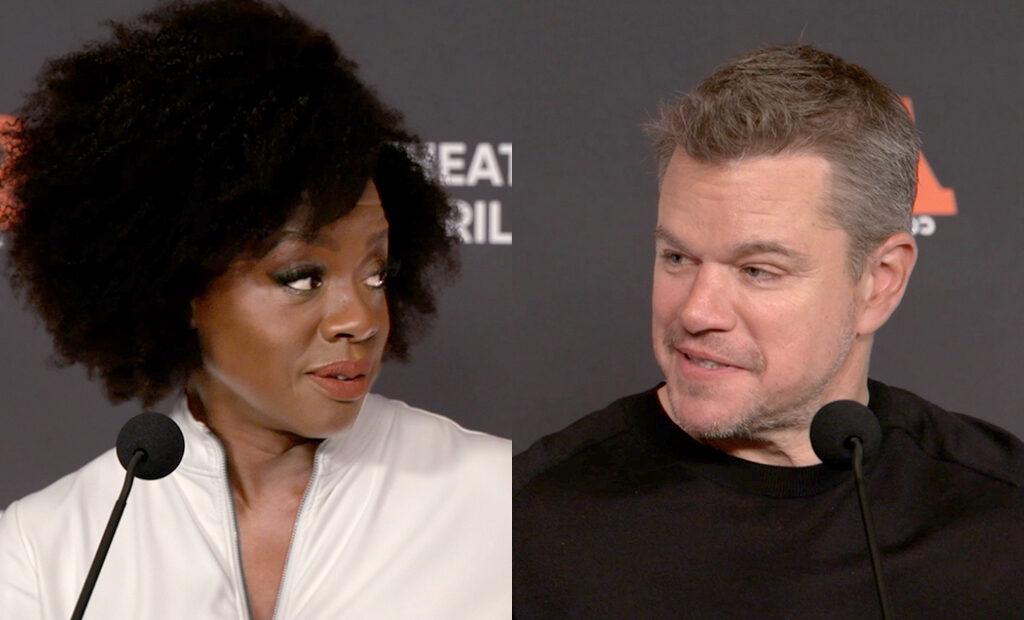
If, like this writer, your knowledge of basketball only ever really consisted of your knowledge of Michael Jordan, that is a testament to the level of fame the athlete has garnered over the course of his lifetime, as only a few individuals do, surpassing all boundaries of his sport and his nationality to become a renowned face and name the world over. Then, even for the newer generation who didn’t grow up in the era he so dominated, mid-pandemic bingeworthy Netflix series The Last Dance was a thorough deep dive into the man and the legend and his impact on our culture, as well as an education for those of us for whom American sports are something of an enigma.
Into that backdrop, then, comes Ben Affleck’s Air. On paper, there’s not much to it. It pulls a single thread that’s mentioned in countless documentaries about Jordan, and that is his lucrative collaboration with Nike to create the Air Jordan trainers. Is that really an interesting topic for a feature film, you may ask yourself? Especially one that puts front and centre the corporate workers and their backstage handling of the process of landing a deal with Jordan. And yet, it’s 100% an immersive, tantalising and inspirational watch.
So what’s to love? For those who grew up obsessed with the duo that is Affleck and Matt Damon in the likes of Good Will Hunting and Dogma, seeing the pair on screen again together as Nike co-founder Phil Knight and maverick salesman Sonny Vaccaro is just effortlessly entertaining cinema. Then we’ve got the always-excellent Jason Bateman and solidly hilarious Chris Tucker as Damon’s coworker and boss, and Chris Messina, as a deliciously enraged foul-mouthed agent, in the mix, who all bring their renowned comic timing and less obvious pathos to their roles. To top it off, the one and only Viola Davis plays Jordan’s tenacious mother Deloris (a non-negotiable condition of Jordan’s for the film to be made apparently). And who plays Jordan himself? In a clever move, the usual star is kept as a silhouette of sorts, allowing focus to remain resolutely on the machinations happening around him, and the untold aspects of this underdog story to surface. The icing on the cake is the full-blown nostalgia-fest of the 80s sets and costumes, an undisputed highlight being Affleck’s get-up as Phil in cerise pink running shorts and leggings. Oh, and his metallic purple Porsche.
Ahead of the film landing in cinemas, The Upcoming had the pleasure of joining the stars and creators for a virtual press conference to hear more about the making of the movie, including Damon, Davis, Julius Tennon (who plays Jordan’s father and is Davis’s real-life partner), Marlon Wayans (who plays coach George Raveling) and screenwriter Alex Convery.
Matt, you have a lot of roles on this one, but we have to start with Miss Viola Davis: it’s kind of cool that the greatest basketball player in the world says only you can play his mum. Talk about that phone call.
Viola Davis: Well, I didn’t get that phone call. But I got a trickle-down message. Listen, I wish it were my style to like get into “best”, “great” – it doesn’t help me at all. But it is flattering because I do go in with a sense of “Do I belong?” and impostor syndrome. So it’s nice to feel wanted. But then the next thought is: now I gotta step into the role. And if you watch videos on Deloris Jordan, she is a study in Zen neutrality. The woman is very, very steady and quiet. I would imagine that even when she gets mad, she’s probably very, very steady [laughter]. So, to really just sort of envelop that spirit and everything was a challenge for me because I’m the woman who always has a chip on her shoulder. I go in bombastic, you know? So, it was both flattering, challenging, and then just a joy to work with Matt and Ben and all these terrific actors. Me and Julius still talk about it to this day: one of the greatest experiences.
It seems a real family affair and that comes from you Matt and Ben, the way went about assembling this group of people, and also your approach to artist equity. How did you balance all the very high priorities that you had for this film – honouring the sports, honouring the artists that you brought along to it, honouring Michael Jordan – as you were trying to tell this story? Oh, and, you know, star in it.
Matt Damon: Yeah, well, let’s see. It all started with the script, really, and that’s down to Alex at the end of the table. I just thought it was so great, and I didn’t know the story. And then it was kind of step by step, I’d say, because the first step was getting the blessing of Michael Jordan to even… because before we got too excited, Ben said we should go see him. And I – my kids were up to something in New York – and I couldn’t go, so Ben went to Florida to see Michael. And Michael’s like, “No, it’s fine if you make the movie, it’s okay with me.” But Ben said, “Well, what I really would love to know is what’s most important to you?” And it was out of that meeting that he said George Raveling, Howard White, and then he started to talk about his mum. And Ben called me afterwards and said it was… Michael’s a very intimidating guy. He’s an intimidating guy, and you know, he’s an icon, and he’s all of these things, and he has all this meaning for all of us. Ben said he had this look on his face when he spoke about his mum that he’d never seen before. And so, we felt like, okay, well now we know what the movie is, right? And he said, “The only bad news is, we have to get Viola Davis and if we don’t get Viola Davis, we can’t make the movie”. So that was when we started thinking about how to expand Deloris. That’s really one of the great things about this cast, is that everybody is really a filmmaker: these two sitting next to me are A-list producers, right? The Woman King, anybody? Marlon, Chris, they’re writers as well as actors, they’re filmmakers, and Jason Bateman’s a director, he’s producing. That’s what we like, we really lean on our actors, and part of our process has always been, from Good Will Hunting all the way till today, it’s like, lean into what your actors are bringing, and the actor always is in the moment and always knows. We had these conversations with Viola like, “If it doesn’t feel right… like, what do you feel like here?” because it’s always the way to the best scene.
The film is subtle with all of the very big statements that it makes, such as when, Matt, you walk into the Jordan’s home, and Julias, your character, James, he greets him, and he’s just lets him walk on back to where Viola Davis is going to sit him down and just keeps working on the car. So talk about the subtleness of your character.
Julius Tennon: Yeah, well, what I wanted to do was bring dignity and levity to Mr Jordan. I mean, obviously, I’ve seen video of him, I’ve seen him with his son, a father that’s proud of his son, a man that’s protective of his wife, and then that’s when I said that whole thing about, “Deloris, call me if you need me,” just kind of let her go do her thing because I know she could do her thing, but I wanted her to know that I’m there, and I’m just going to do what I normally do in the course of the day. He was just a simple man, a blue-collar guy, and so I just wanted to depict that.
And Viola, can you talk about the beauty of that masculinity and playing that dynamic of a couple on screen?
VD: Well, let me tell you something, that is our dynamic in real life, you know? Julius has told me since we got together, he said, “V, now when you come home and it’s late at night, you make sure you don’t get out of that car until the gates close. And if someone’s following you, you lay on that horn, and I’m gonna come out with my baseball bat…” And I lay down the horn once by accident coming home at three o’clock in the morning, and I counted to five. Julius came out with the baseball bat, and I knew. I was like, “That’s it. I’m gonna marry him. He’s my dude.”
Marlon, learning about the man that you’re portraying, George Raveling, was like learning about Hamilton, he’s done so many things. Was that all there baked into the script? Or did you go on a discovery journey of your own?
Marlon Wayans: I was the first one to shoot, so I got the call on Friday, and we shot it on Monday. So YouTube was my friend: a crash course on YouTube and George Raveling. I learned a lot about him. I learned he was a fantastic man. He himself, he was the first Black coach to win a national championship. And he coached on the Olympic team, and he’s from Jersey. So, there was a lot that I picked up. And when I read the monologue and the fact that that was real and that he still has the “I Have a Dream” speech in his possession, I just thought that it was an amazing character to play. And the more you research, the better you can do in terms of your performance. But what I loved was when we went on set, Matt and Ben were like, “You know, we’re not impersonating. You can bring you to it.” And that’s always, for an actor… the best thing you can do is when I can mix that person with my emotions and what you bring. And then, the script was already written so beautifully. But, we got to play. And then I could get out of my head and really have fun. And that’s what it was when I left the set, I just felt like, if every day on that set felt like the first day, that’s gonna be a magical movie.
Alex, for your first feature, this is such a big film. But it started with you and the pen. Was this a story that you knew so much about already? Are you even an 80s baby?
Alex Convery: No, I’m not. Oh my gosh, I’m a 90s Chicago kid, which is where the Bulls and Michael Jordan and that connection comes from. But no, look, I came to the story like everyone else. I was locked up during those first couple of months of quarantine, watching The Last Dance. And there’s a little five-minute clip about Nike and just how Air Jordan came together. And I was at a point in my career where you’re trying to write a script that gets noticed. When you can explain the movie in one sentence – it’s a story of how Nike got Michael Jordan – it just has that ability, it goes to the top of the pile, and people will give it a bit more of a chance. But like everything, it comes down to character, right? So the question was, who can be the protagonist and the engine of this movie? And finding both Sunny and Dolores was really what, to me, elevated it above just a movie about a shoe and Michael Jordan. It’s finding the human elements in a very big movie. I call them big little movies. The little being, this is just a movie about a shoe deal, right? And it takes place over a week or so, and it’s small in scope. But the big part is when you say it’s about Nike and Michael Jordan, which – you could talk to a hundred people on the street, and all 100 of them are going to know who Michael Jordan is and what Nike is. And to me, that’s what elevates it above just a movie about a shoe.
Matt, with your character, you’ve joked about the physical transformation that Ben put you through, but you also brought this uncompromising, pig-headedness to Sonny that you have to have when you want to achieve an impossible dream, he’s so rude to everyone at so many points. That’s something that’s hard to feel empathetic with sometimes, but you made him such a lovable character. Talk about how you made this character,
MD: Yeah, a lot of it was really there on the page with what Alex wrote. We were really trying to capture the spirit of these people in this time more than anything, not exactly who said what at exactly what moment. It was really about: all of these people on the Nike side, independent of one another, have talked about this time with such nostalgia and that’s what we were trying to create, and remind people they were the underdog, which is such a weird way to think of Nike now. But before this incredible deal, they really were these renegades, outsiders. And so that was really what we were trying to get. The characters just all had this incredible infectious energy, I thought, that was really jumping off the page. The script was really quite something.
The fact that the script came through the Blacklist, where you can send an unproduced script for people to take a look at, and then it got to you guys and Amazon and here we are, and it’ll be in cinemas on 5th April – that’s kind of a Phil Knight story in a way, kind of a Deloris story, this audacious and aspirational hope that then comes through. Viola, Ben Affleck told us that directing you was one of those impossible aspirational dreams.
MD: He didn’t feel that way about directing me!
What was it like for you working with him? Actor-directors can bring an entirely new dynamic. But also, you seem like you had to undo all of your years of Juilliard to be less expressive, to just allow yourself to be the character in the sense of her focus.
VD: Well, that’s who she is. Once again, Zen neutrality, that’s what I see with this woman, this incredible woman. I wonder if she plays poker, you know?
MD: She did! I mean, this deal was like the greatest hand of poker ever played!
VD: You know what, here’s the thing with Ben – and Matt – but Ben is: you trust him. There are a lot of times you go on set, you don’t trust anyone because, truth be known, there are a lot of people in our profession who don’t know what they’re doing. I’m not saying that from any kind of place of condescension or giving anyone shade. But everyone sees a result of a movie or a career, but they don’t see the journey. And it’s the journey, it’s the process, where you see the artistry, the people who actually know what they’re doing, know how to piece it together, know what they want, know what they’re seeing in the camera that’s not working, knowing how much, how little. And oftentimes… I’ve had a 40-year career where I’ve trusted certain people, and they have done me wrong because you don’t always see it. You do need help sometimes. I trusted him. I trust what he saw. I trusted his process. I trusted his choices, even in actors, that they were going to deliver. And then you have to ultimately trust that he chose you for a reason, because that’s the one thing that training school beats out of you is any sense of confidence and level of mental health. So, trust, is what I’ll say.
Matt, both you and Ben are really big into sports, but becuase of the elements in the film, such as Viola Davis, you can Trojan Horse other viewers into the film as well. Was that part of just the initial idea of what you wanted to do, to make it feel like a big crowd-pleaser even though it’s a smaller story?
MD: Yeah, I mean, I’m bringing my kids to the premiere. And it’s totally appropriate for them. It’s really one of those stories that comes along, and you go, “Wow, this is really for everybody”. We used to call them, I guess, feel-good movies. But that’s really what it is. You should leave the theatre with a skip in your step.
The reception for the film in Austin for SXSW was just off of the charts. Have you premiered a film in Austin before?
MD: No, that was my first one.
What was it like?
MD: It was incredible. I knew we were in good shape when Viola walked on screen, and the crowd went crazy. I was like, “Oh, this is good. This is going to be good.” Yeah, it was really cool, and it felt like…I’ve been to so many film festivals, and that one just felt like everyone was so excited we were there, so excited for the movie. There was just a great energy in the room. I’ll never forget it.
And Viola, it must not be very often that you could feel like you’ve got a Beyoncé, superstar, Taylor Swift-type perception. What was that like for you to experience Austin?
VD: Awesome, you know, Julius is an Austinite.
JT: Yeah, a lot of family members back at the place. I didn’t see many of my family members, but the reception was awesome. It was incredible, electric.
Marlon, to come back to you, in your weekend of studying for your role, did you also look into his Martin Luther King stuff and activism that he did? Because he was more than just a coach, he really was somebody that was an advocate for both athletes and professionals that straddle both?
MW: Yeah, he was. Raveling’s an amazing, amazing dude with an amazing story. He actually was at a young age down there at that, not that march, but at that rally. And he had a long, long career of that. And just to be able to know you’re doing a movie about… I mean, it’s such a small part, but they say there’s no such thing as small roles, only small actors. With this one, it was a small but pivotal role. You feel it, when you look at the script and you go, “I gotta do this,” you know? And so many times, you think about a scene, you’re like, “I ain’t in the scene,” but then you look at the meat within the scene and the character that you’re portraying, and then you look at the whole picture, and you just go, “It’s something I had to do.” There’s no way you don’t do something like this or have the opportunity to play with all these legends. You just go bring your best, and it was a great scene, and I’m very, very proud to be a part of this picture.
The film is very intriguing, but it might also surprise people how funny it is and the very important themes it delves into. What would you say, for people coming to this who maybe aren’t going in for Michael Jordan or the sports, or don’t know who these people are, they’re not going for Viola Davis or you and Ben, what would you say is something about this film that will surprise them when they come to see it in cinemas?
MD: Well, if you don’t like Viola and me and Michael Jordan and Ben, then you probably shouldn’t go! [laughter] No, I really do think there’s something for everybody in this one. It’s not a strict sports movie. I think for the sports aficionados, they’ll love the behind-the-scenes, behind-the-curtain type of stuff that’s in here. But it really… I think it surprises a lot of the people who weren’t expecting it. It sneaks up on you because of the role Viola plays and how she kind of takes over the movie. I do think there would be something for everybody in this one.
MW: You just feel good about the movie, and you feel good as a human with an everyday story of: we all have dreams, we all have something that we want to do. Everybody tells us we cannot do it, and just the fact that this man made that happen… and look at the iconic thing that was spawned from that: Michael Jordan signing with Nike to this shoe, to this brand, to this thing that changed pop culture in a huge way. I just think it’s a very powerful movie, and it started with something small like a person with an idea and a gut feeling to make something happen. And we all, as people, every artist up here, had an inspiration or a gut feeling about what we wanted to do in this lifetime, and everybody telling us no, and we, every day, make it happen.
MD: Well said.
JT: That was awesome.
Sarah Bradbury
Air is released nationwide on 5th April 2023. Read our five-star review here.
Watch the trailer for Air here:

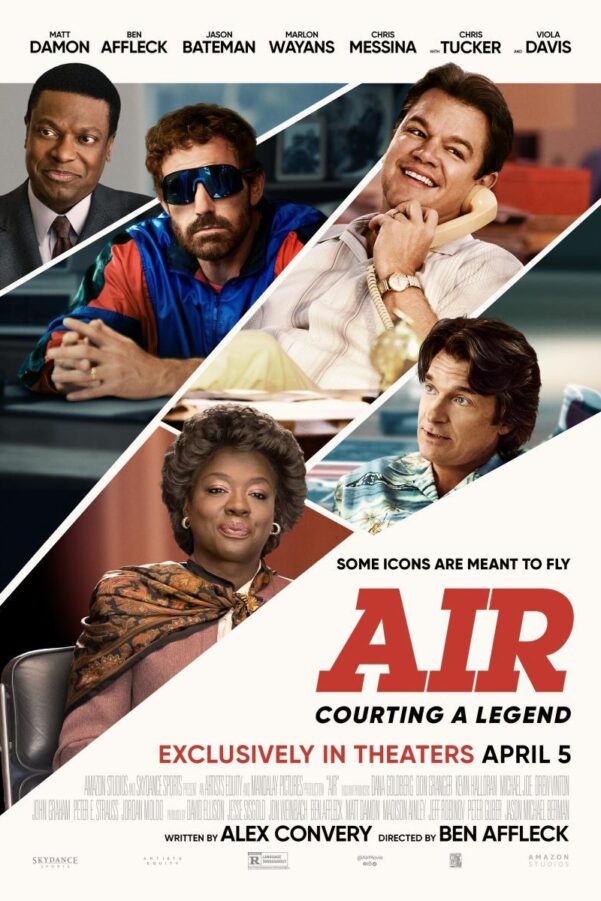
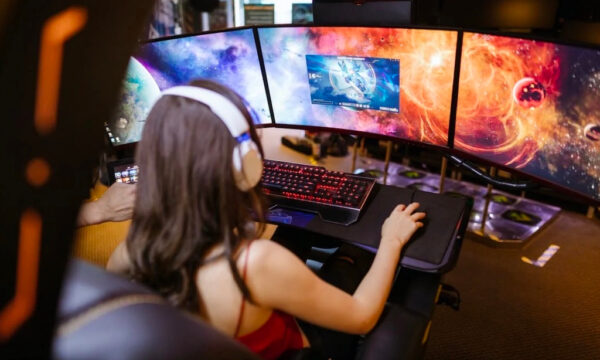
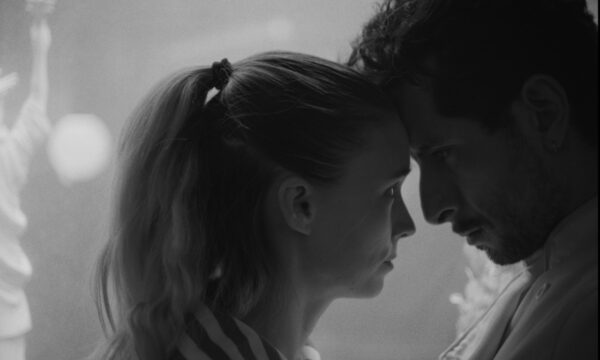




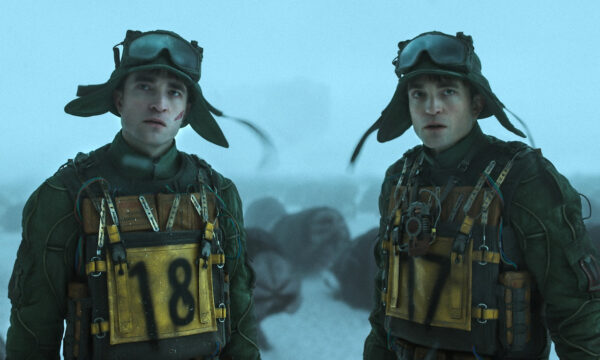















Facebook
Twitter
Instagram
YouTube
RSS